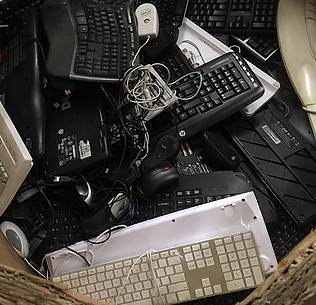
Docka
This Ikea circular economy design and product redesign utilized insights distilled from the e-waste downstream to redesign Ikea's global supply chain and serve as a model for what an in-house circular economy could look like.
Design Strategy | Competitive Landscaping | User Research | Content Photography | Strategy | Product Design | Design Strategy | Story Boarding and Illustration
Partnering with:
Homeboy Electronics Recycling

Product Redesign
Circular Economy


Retail Experience

_
Solution: Use a product take-back system to create engaging customer experiences and build brand loyalty, while cutting down on waste and emissions.
Problem: Companies only address the front end of a product's life cycle, leaving e-recyclers to tackle impossible volumes of electronic waste.
_
Research
.png)
Understanding the downstream
Redesigning the upstream requires and understanding of disassembly practices. When inquiring what problems occur, Brian reviled companies make products difficult to disassembly to protect their IP and save costs.

" Use screws not glue!"
Brian Fox
Itad Division Manager & Electronic Repair Specialist


Difficulty Disassembling
is a big problem for electronic recyclers, the effort and time it takes often is a bigger hassle than the value the recycles get back. Labeling is used to make efforts more efficient.
Overwhelming Volumes of E-waste
makes it difficult for recyclers to keep up, often times making quick, dangerous disposable tactics, such as smelting, the more lucrative .

Companies Acting Irresponsible
Making products cheaply, intended to be bought frequently and for consumers to buy more than they need to keep current.
x
Building off Ikea's
Current Model

Ikea's Global supply chain, consisting of many cheap electronics and their current plan to go green makes them the perfect company to make an impact.
Returning products is a common occurrence. The space is placed at the exit and consumers only visit this area when relevant. There is a big opportunity to make this a first.

Benchmark Product:
Ikea Rallen
Product contains extraneous amount of different materials and lengthy disassembly time.

Measuring Current Impact


Highest impact steamed from material extraction, refining, and processing as well as disposal
Opportunities for improvement:
_
Problems and Solutions
01

Problem: Ikea uses band-aid fixes for a bigger environmental problem
Solution: Make Ikea the leading example for sustainability and create an engaging user experience
02

Problem: Electronic parts are difficult to disassemble
Solution: Make recycling e-waste as easy, visible, and transparent as possible

03
Problem: Mass production treated as a one-way system
Solution: Reduce impact from materials used in the product and extend the usage of the material

Final Design:
Ikea Docka &
Consumer Take-Back
System

Designed for disassembly
+ Labeled parts
+ Special tool open tabs
+ Disassembly area
+ 100% recyclable
Current Linear Life Cycle

New Circular Life Cycle

Recycling as Branding

-03.png)
Recycling as Branding
Makes a material logo that is familiar yet unique to the product.
CMF Strategy
Standardized polypropylene materials enables closed
loop system


Energetic Singles
Satellite Employees
Newbie Families
Freshmen Dormers




Cool Splash
Black Star
Confetti splash
Midnight
Target Users





Product return station
By giving reward point when users return electronics, it encourages consumers to participate in the system and raises brand loyalty


x
x
Keep the existing recycling center at the exit, but add a return product area at the store entrance.
Opportunities for improvement:


Dematerialization
By integrating material with a line of furniture, the amount and variety of material can be reduced.





Improved Impact Matrix

Product impact before:
Product impact after:


Improvements
Benifits
+ Circular economy are normalized to
consumer
+ Less materials extracted
+ Less waste
+ Smaller carbon footprint from
material processing
+ Smaller shipping footprint
+ Almost 100% recyclable


